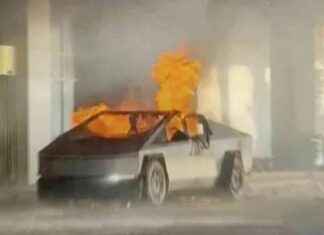Tens of thousands of people evacuated, nearly 400,000 hectares burned, oil installations shut down: two days after declaring a state of emergency, the Canadian province of Alberta asked for help from the federal government on Monday to fight “unprecedented” fires.
Monday evening, nearly a hundred forest or brush fires were still active in the province, including 25 considered to be “out of control” by the authorities.
“Alberta has requested assistance from the federal government to deal with the devastating fires. Prime Minister Trudeau assured me that Canada would be there to support us in any way possible,” said the premier of the province. Danielle Smith, who spoke of “unprecedented” fires on Saturday.
“Canadians stand with the people of Alberta who are coping with these terrible wildfires,” said Justin Trudeau.
Firefighters are focusing on those threatening homes, especially around the main city of Edmonton. Authorities said nearly 300 patients and residents of long-term care centers had to be evacuated, and more than 50 schools were closed.
Several oil companies – Vermilion Energy and Crescent Point Energy in particular – said on Monday that they had to interrupt production in places because of the fires.
In total, nearly 400,000 hectares burned in less than a week despite the deployment of several hundred firefighters. The Premier of the province warned Monday evening that the fires “could continue for several months”.
Among the 30,000 evacuees from the province, some found refuge in centers for evacuees while others fled with their camper vans or caravans and regrouped on vacant lots. Still others are staying with friends or family, like Jerry Greiner, a resident of Drayton Valley, 150 km west of Edmonton.
“On Friday, we could see the smoke and there was quite a strong wind,” he told AFP, tears in his eyes.
“In the evening, we received the first alert around 10 p.m. and then the final evacuation notice around 11 p.m. We quickly took our bags to go to our friends’, adds the 55-year-old man with gray hair, evacuated for the first time.
Around this town of 7,000 inhabitants completely evacuated, the forest and the fields are blackened by the flames even if most of the houses have been preserved, noted an AFP journalist on the spot.
The city, caught in the smoke, is still forbidden to access, the fire being mastered but not completely extinguished.
Installed in a center for evacuees, Kathy Bereuwski, 61, is in shock. “The last few days have been very difficult, very stressful,” she told AFP.
“The sky was black, black from black. We could not see anything. And a cloud of ashes fell on us”, adds this woman, long and white hair tied up.
In Fox Lake, northern Alberta, a violent fire destroyed 20 homes, a store and a police station. Residents were evacuated by boat and helicopter.
The Canadian province of Alberta, one of the world’s largest oil producers, “had a hot, dry spring, it only took a few sparks to start some really scary fires,” Danielle said over the weekend. Smith.
Alberta, like its two neighbours, British Columbia and Saskatchewan, is currently experiencing “abnormally dry” conditions and even “severe drought” in places, according to the latest Canadian government surveys.
In recent years, western Canada has been hit repeatedly by extreme weather events, the intensity and frequency of which have increased due to global warming. In 2021, a “historic” heat dome killed hundreds and was followed by major fires.
The authorities hope that the arrival of cooler temperatures and a little rain will help to contain the situation.
This change in weather is “an unexpected chance to succeed in countering the progression of certain powerful and difficult fires”, estimated Monday Christie Tucker, spokesperson for the relief. “But we are not out of the woods yet.”
In May 2016, in the north of the province, a gigantic fire ravaged Fort McMurray, the largest industrial oil sands complex in the world, becoming the costliest disaster in Canadian history.
09/05/2023 02:53:49 – Drayton Valley (Canada) (AFP) – © 2023 AFP






